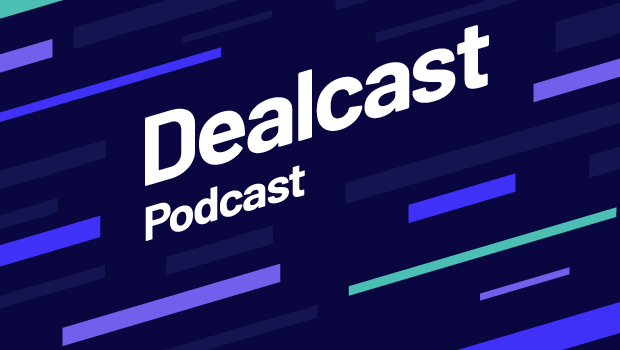DACH M&A Dealmakers Are (Somewhat) Bullish On H2
28 April 2023
In this week’s episode, we’re examining key takeaways from the Mergermarket M&A Forum Germany 2023 held in Frankfurt with DACH Correspondent Patrick Costello.
Listen to learn about:
• Impact of the Ukraine conflict on valuations, financing and exits
• Why private deal flow isn’t as robust as expected in Germany
• Fundraising challenges for general partners
• Capital flowing into DACH from the Middle East and Asia
Dealcast is presented by Mergermarket and SS&C Intralinks.
Dealmakers, download the Q2 2023 Deal Flow Predictor here.
Transcript
[THEME MUSIC] JULIE-ANNA NEEDHAM: Hello and welcome to Dealcast the weekly M&A podcast presented to you by Mergermarket and SS&C Intralinks. I'm Julie-Anna Needham. I'm a business journalist who's been covering M&A for a decade. In this episode, we're looking at the recent Mergermarket Germany forum and some of the key takeaways from that event. I'm joined by Patrick Costello, who is the DACH correspondent and who was there. Hi, Patrick. Thanks for joining me today.
PATRICK COSTELLO: Hi, Julie-Anna. Good to see you.
JULIE-ANNA NEEDHAM: So let's start with an overview. What was the general overview or the mood of the event?
PATRICK COSTELLO: I'd say the mood had a mixed outlook overall. Dealmakers were pretty slightly bullish, I'd say, for the second half of the year, although they're admitting that activity is not as busy as people would like it to be. Large cap M&A in Germany in particular is still very quiet at the moment. Particularly given financing issues, I think dealmakers, advisors, and private equity corporates, they're having a lot of issues financing bigger deals at the moment.
On the other hand, the small and mid-cap segments of the market are still pretty lively. I think there's still a feeling pretty consistent deal flow, and there's a lot of activity in certain parts of the market. And people expect that at least will continue throughout the rest of the year.
JULIE-ANNA NEEDHAM: Right, thank you. Germany is one of the most active markets for private equity in Europe. What were the main takeaways from the event about private equity?
PATRICK COSTELLO: Well, in terms of private equity, I think overall, people are saying that deal flow is not as robust as it is expected to be. I think if you look at a lot of the portfolio assets in Germany and the length of time they've been held by private equity sponsors, we're not seeing what you would expect, given the vintage of some of these funds. And then when you look at the buy side, there is still a lot of dry powder sitting among the sponsors across the market. So you think the two of those things together, you would be seeing a lot more activity than we're currently seeing.
JULIE-ANNA NEEDHAM: Yeah, and I think the dry powder theme has been around for quite a long time.
[CHUCKLES]
PATRICK COSTELLO: It's a lot of money they've got to invest. The idea, I think one of the main takeaways from the conference on private equity investing is that the pressure on the sponsors is going to continue mounting going forward. So I think on the buy side, the investment side, I mean, the pressure for them to spend this dry capital, which as we've mentioned is pretty substantial, that's just going to keep balancing on them. They need to invest this money at some point.
And then in terms of exits, pressure on the sponsors is likewise also going to continue mounting. They're going to have to deliver returns to their LPs at some point, and they need to show results from this money that they've invested in these assets they've invested in in the past. And that in particular came up a few times in some of the panels.
As the sponsors get ready to raise their next fund, their next vehicle, they're going to need to serve results to the LP community when they are back investing again. Fundraising in particular looks like it's going to be a little bit more challenging across the board going forward. So they're going to need to deliver some good returns to make that possible.
JULIE-ANNA NEEDHAM: And just on that, Germany is obviously much closer to Ukraine. Do you think there's been a lot of sitting on assets while watching the situation in Ukraine unfold?
PATRICK COSTELLO: Definitely. I think some of the high-growth companies, especially in sectors like tech, I think because there was a readjustment in terms of pricing over the past year, people are a bit reluctant to sell now because they don't think they're going to get the price they can get or should get. So that's definitely been a factor slightly related to the war. I think the biggest impact from the war, though, has been on the financing markets. And that's been one of the biggest challenges for dealmakers the past year in closing transactions.
JULIE-ANNA NEEDHAM: Yeah, and that leads perfectly onto my next question, which is what are the big challenges for getting deals over the line. You've mentioned one with financing. What else is there? And with the financing, what deals are getting done?
PATRICK COSTELLO: Yeah, well in terms of financing, I mean, it's the combination kind of inflation of interest rates. I mean, we all know this. While the ECB is raising rates, it's making it a bit more difficult to calculate what financing is. But also, the costs of it have gone up.
The other arguably biggest challenge, which I alluded to earlier, was pricing. I mean, there's still a bit of a mismatch between what sellers think and expect they can get for their assets. And on the other hand, there's a bit of a reluctance now for buyers to meet that price. And it's also a question of whether they would be able to meet that price with financing issues. So this rebalancing needs to go on before they hit a new equilibrium.
For deals that are transacting at the moment, as I mentioned, the small mid-cap segment is still pretty lively. But also, assets that are in general just seem to have a high quality. So in the tech space, it's software companies that have really strong, reliable, visible cash flows. They're still in very high demand. Health care in Germany is a very hot sector, especially in areas like medtech.
So again, if you have a company there that's performing really well-- good cash flows, good EBITDA, they are also still getting over the line. In general, panelists were calling this the flight to quality. So the assets that are just being reliable, high quality-- not so much on the strong growth segment, which is what we saw in the past few years, where it was growth, growth, growth, I think people want to see of a bit more profitability and a bit more maybe consistency in terms of a business' performance.
JULIE-ANNA NEEDHAM: Great, thank you. Talk a bit about cross-border M&A and what the main takeaways were from the talks and panels. And what was the conclusion or outcome of those discussions?
PATRICK COSTELLO: Yes, so for cross-border M&A, I think investment has gone down over the past year. It's held up fairly well. But again, the Ukraine war, there's been some reluctance, I think in particular from the United States, to invest in German assets. As you mentioned earlier, Kyiv's a two-hour flight time from Berlin, so a little too close maybe to a war zone for external capital.
On the other hand, there is still a lot of money flowing into Germany and the DACH region from the Middle East and Asia. I think if you look at the Porsche IPO in particular last year-- which, I mean, a bit of an exception. But there is strong, strong demand from the Middle East in that IPO. And I think that will continue for certain, again, quality assets.
I think on the other hand, as the situation with Ukraine has maybe stabilized a bit, as compared to a year ago, we're seeing somewhat of a return of US investors into Germany. The exchange rate dynamics, as you know, are very favorable to US investors at the moment. So the view of the panelists are expecting that as the situation maybe continues to stabilize, we'll see a lot more American interest in German assets because the prices are favorable to them. And this is an easy way for them to enter the German market going forward.
JULIE-ANNA NEEDHAM: So can we look ahead now? What did you hear from speakers at the event about what German corporates will be doing during the rest of 2023?
PATRICK COSTELLO: Yeah, a good question. So in terms of corporates, people across the board are expecting them to be very active for the rest of the year, both on the buy and the sell side. In terms of buy-side activity, there's a few processes we've been writing about and tracking that are mainly, or even exclusively, geared toward corporate buyers. I think some sellers see them as maybe a more reliable purchaser at present because they have stronger cash flows, and can more easily do deals with equity and cash, and aren't so handicapped by the financing markets like private equity is.
In terms of sell-side activity, though, this is maybe a little more interesting. A lot of dealmakers have been saying that corporates are really focused on portfolio alignment at the moment, so really taking a look at what their organizations are doing, and looking to see where they can jettison or shed some non-core assets. So people are expecting the market will see a lot more of this going forward.
I mean, we're already seeing some of it. I think some of the stories we've written about this year-- I mean, Lufthansa is selling a stake in the Lufthansa Technik, so the maintenance unit.
The DFL, the German Football League, is selling a stake in its media rights. Qiagin is offloading its stake in its bioinformatics unit. There's a Merck chemical subsidy going around. So corporates, I think, are expected to be pretty active this year.
JULIE-ANNA NEEDHAM: Great. Thanks very much, Patrick. That was Patrick Costello. Thanks for listening to this week's episode of Dealcast, presented by Mergermarket and SS&C Interlinks. Please rate, review, and follow the podcast.
You'll find us on Apple podcasts, Spotify or look out for your Mergermarket news alert. For more information, have a look at our show notes. Join us again next week for another episode.
[THEME MUSIC]


